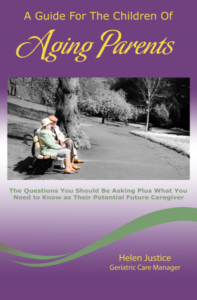Each human being is a combination of body, mind, and spirit; we should be aware of how these parts interact. For example,  people may have powerful emotional responses while facing the many challenges which life presents. Thus, some may often appear cheerful and optimistic while others are anxious and unhappy. In later years, we usually continue our basic moods, but the ways we express our feelings often become more obvious. Maintaining
people may have powerful emotional responses while facing the many challenges which life presents. Thus, some may often appear cheerful and optimistic while others are anxious and unhappy. In later years, we usually continue our basic moods, but the ways we express our feelings often become more obvious. Maintaining
Depression: Signs and Causes
In the midst of losses, such as physical changes, death of friends or loved ones and reduction of income, older people may begin showing signs of depression. Some things to look for are:
- inability to concentrate or make decisions,
- lack of feelings of enjoyment, or enthusiasm even for doing those things that were favorites,
- little interest in eating (causing weight loss) or changes in eating habits (overeating causing weight gain),
- lack of interest in being with other people, or loss of sex drive (libido),
- feeling unwanted and worthless, sometimes leading to the thought that life is not worth living,
- sadness or crying spells for no apparent reason,
- problems with sleeping (sleeplessness during the night or excessive sleep during most of the day),
- feeling tired most of the time, regardless of adequate rest.
If older people brood about their unhappiness, much of their energy is focused on worry. Part of that worry may relate to the fear that they will become forgetful and unable to manage their affairs. This worry can lead down the path to more depression, which may cause physical problems.
In exploring the cause of depression, the following questions should be asked:
- Is there a physical or medical problem causing the depression?
- Have there been changes in hearing, seeing, moving, or other body functions?
- What social contact does the care-receiver have?
- What are the opportunities for usefulness?
- What kind of personal losses (death of friends, relatives, or pets) have there been?
- Is the older person getting proper nutrition?
- What kind of mental stimulation is the person getting?
- Has there been a difficult adjustment following retirement?
- Is the focus entirely on the past or is there some enthusiasm about coming events?
- Is there a possibility of reaction to medications?
- Is there a dependency on alcohol or drugs?
Once these questions have been answered, steps can be taken to relieve the depression. It will take some work from both the caregiver and the care-receiver to change habits and routines. Prolonged depression causes biochemical changes in the brain, usually requiring treatment with medication. The doctor is a good person the contact to find help for treatment of depression. Other resources are County Mental Health Centers, psychologists, counselors or clergy.
Suicide Prevention
Suicide among the elderly is a significant and ever increasing problem. Statistics show that 27 percent of all suicides in San Diego county (1985-87) were committed by people 60 years of age and older. Nationally, elderly (65+ years) made up 12.3 percent of 1987 population and committed 21.0 percent of suicides. Elderly complete one suicide every 1 hour and 21 minutes, or each day 17.7 seniors committed suicide.
Unlike other segments of the population, the elderly do not often make threats or mention suicidal thoughts to others. Therefore, it is important that caregivers also know other warning signs:
- Depression – feelings of sadness, hopelessness, a sense of loss and statements as “Life isn’t worth living” are common before a suicide.
- Chronic or terminal illness.
- Withdrawal and isolation – suicidal people may pull away from family, friends and others close to them.
- Behavior changes – sudden changes such as irritability, aggressiveness or changes in eating and sleeping habits can signal problems.
- Making final arrangements – a suicidal person may give away valued possessions, making out a will, make a plan for suicide, or write a suicidal note in preparation. They may purchase weapons or stockpile medications.
Suicide can be prevented. If the person you care for shows any of the warning signs, you can:
- Ask – don’t be afraid to ask directly if the person is thinking about suicide. It is not a taboo subject. You will not be putting ideas into the person’s head. It can be a relief to the suicidal person to talk openly about their feelings.
- Listen – let the person express his/her feelings and concerns. Don’t worry about saying the right things – just listen.
- Show you care – tell the person you care and want to help. Take active steps to make sure the person is safe; remove weapons, pills, etc., and stay with him/her.
- Get help – make sure the suicidal person gets in contact with a professional counselor or other helpful person who will know what to do. Or have the suicidal person call (suicide prevention/crisis intervention Hotline in your community. Telephone numbers for such local resources should be at the front of your telephone directory.) A crisis counselor can help figure out the best way to handle the situation and give referrals to other resources.
Death and Dying Interventions Elderly terminally ill encounter anxiety and fear regarding death:
- fear of the process of dying; will there be pain?
- fear of losing control; will I be at another’s mercy?
- fear of letting go; I can not leave family and friends to an uncertain future.
- fear of seeing how others will avoid me.
- fear of losing my caregiver; will he/she be turned off emotionally to me?
- fear of the unknown after death.
- fear that my “life’s script” has been meaningless, unfulfilled, a waste.
You may wish to ease these fears through an open discussion of these fears and intervening:
Regarding the death process, a “faith system” may be of great help; if you can get the person involved in his/her religious faith, the subject of death is well covered.
Regarding fear of letting go and isolation, assist then person to get his/her “house in order.” This entails a will, funeral arrangements, burial plot, etc. Also attempt to have the person and family involved discuss the situation.
Regarding meaninglessness of one’s life, have the person do a “Life Script,” whereby he/she writes all the good things done for others, all accomplishments, etc. Then discuss with the person that had he/she not been there to do what he/she did at that time, no one else would have, and society would have been the worse for it. So he/she did make a difference. Truly, no person is an island!
Promoting Emotional Well-being
It is important to help the elderly remain involved in decision-making as long as possible. You must stress that needing help with everyday activities does not mean that they cannot make decisions for themselves. Also, granting others the right to decide does not mean you are ignoring or abandoning them. Caregivers need to be sensitive to the right combination of giving just the right amount of assistance and no more.
Ways to promote good mental health in the elderly:
- encourage socializing with friends and relatives through visits, phone calls or letters.
- arrange fun times such as parties or outings.
- help start new hobbies or revive old ones.
- listen, talk, and share feelings.
- assure privacy.
- treat with respect, not as little children unable to think for themselves.
- encourage movement and exercise.
- help find ways to be as useful as possible.
- strive to keep the lines of communication open.
The Importance of Lifetime Learning
Research shows that reaction time may be slower in older people but they can still learn. Families and friends may need to be patient in waiting for responses. It is also important to remember that short-term memory may not be as good as it was.
The brain helps link people to the world. If we are able to process and understand what we see, hear and absorb from our senses, our experiences will become more meaningful.
Sometimes older people are incorrectly labeled as “senile”; the misconception is that they are no longer able to think for themselves. However, for the most part, older people continue to make good use of their creative powers, and as is true for all parts of the body, the brain usually will function better if it is used regularly.
Lifetime learning means exploring new ideas, whether this is from reading, listening to radio or television, trying a new hobby, or trying a new recipe. It can include lively conversation with friends and family. What it boils down to is a willingness to keep exploring the many adventures that life has to offer. The benefits of lifetime learning include more enthusiasm for life, less boredom and depression, increased feeling of self-esteem and self-respect, more interest in the surrounding world, and new ideas to share with family and friends.
Memory Problems
Memory loss can be one of the hardest problems for both the care-receiver and the caregiver. Some memory problems are treatable, some are not. Therefore, it is important for the doctor to determine the causes of memory loss in the individual. Forgetfulness, even inability to recognize familiar faces and places, might result from such treatable causes such as malnutrition related to improper eating habits, alcohol, side effects of medications, loneliness, isolation, few chances to socialize with others, sensory impairment (decreased vision, decreased hearing), surgery or accident resulting in injury to body, viral infections or other illness, or depression or other mental illness.
Sensory Problems
People who have losses in hearing and vision may have trouble understanding things consequently negatively affecting their emotional well-being. Basic aids to hear and see are vital. At times an older person may be cut off from the world because of wax in the ears or worn out hearing-aid batteries. Glasses may need to be adjusted or perhaps just cleaned. Good lighting, without glare, is important. Magnifying glasses or large print can make reading easier.
Confusion
For people who are confused, the following tips can be useful:
- Make changes in routines gradually,
- Be clear about reminders for appointments or meetings,
- Write simple directions in large, clear print,
- Use large labels (words or pictures) on drawers and shelves to identify contents,
- have clocks and calendars clearly visible and mark off passing days,
- Make certain that medicine is being taken regularly,
- Confused or forgetful patients must have assistance with their medications,
- Encourage consumption of nutritious foods,
- Encourage movement and/or exercise as this will increase circulation of the blood and help improve bodily functions, including the ability to think.
Behavioral Problems
For people who are acting out, being disruptive, or have other undesirable behaviors, it is best to not antagonize or confront but to temporarily remove your presence from the person, giving the message that “I love/care for you but not this behavior.” Below are some suggestions to minimize undesirable behaviors:
- Avoid confrontation. If the behavior deals with disrobing, offer brightly clothes which make the person feel good.
- Don’t argue. If the person becomes too agitated, change the subject/object to something completely different.
- Reduce stimulation. Lower lighting, reduce noise (radio, TV) to soothing music, minimize items in the area to a few possessions known to the person, and avoid clutter.
- Promote familiar objects, pictures.
- Walk slowly with the person to reduce anxiety and stress the muscle tension.
Mental Stimulation
Because many older people enjoy recalling events from past years, families and friends should encourage the sharing of stories. Activities which stimulate the brain (visiting with others) can contribute to the goal of continued lifetime learning.
Often, older people can become happier, more productive individuals when they are encouraged to perform fun, brain-stimulating activities. The following activities are especially good for homebound elderly:
- sew or knit,
- be a friendly telephone caller,
- be a foster grandparent,
- be a pen pal,
- be a reader to children at an elementary school,
- save stamps for collectors,
- write favorite recipes on cards and share them with others,
- read books, magazines, newspapers,
- do puzzles (jigsaw, crossword),
- try artwork (calligraphy, painting, drawing),
- write or record memoirs, poetry, thoughts,
- keep a joke book,
- care for pets or plants,
- listen to soothing music,
- take correspondence courses,
- play musical instruments,
- start or re-arrange a family photo album,
- volunteer, at libraries, hospitals, museums, schools, Retired Senior Volunteer Program (RSVP),
- bake for self and others,
- plan a potluck or brown-bag lunch at home,
- tutor or visit with children and youth,
- type for self and others,
- participate in radio call-in shows,
- learn to use a computer.
- In addition, older people who are physically able should be encouraged to participate in swimming, bowling, gardening, dancing, miniature golf, nature walks, mall-walking, jogging, shuffleboard and other activities outside the home.
- Drawing, writing, reading, crafts, taking classes, and other hobbies encourage creativity. Indoor games including chass, checkers, monopoly, cards, billiards and Parcheesi provide interesting relief from boredom as well.
Copyright 2017 – Helen Justice GCM – Elder Care Navigator and Advocate – Advanced Wellness GCM, Inc
Known by many as “The Elder Care Navigator”, Helen Justice is a Certified Geriatric Care Manager trained to assist elders and their families with the process of aging with dignity and grace. Her knowledge and experience insures elders obtain quality care and transitional preparation for their future. More important than the financial aspect of aging is the social and emotional component that elder care places on the family. Go to www.advancedwellnessgcm.com for information on no fee seminar.



Stay Up To Date With AWGCM